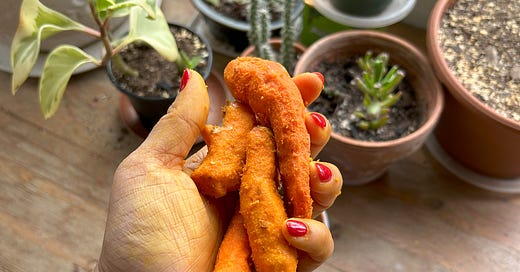I’ve spent my life searching for a sense of place, of roots. I’m fascinated by how we construct identities around where we come from, how we find meaning in belonging.
I’m interested in where things come from because it’s a question I’ve never been able to answer for myself. I was born and raised in Southeast Asia by Bengali parents. I’ve lived in five countries, a foreigner in all of them. Each place is a part of me, threads in the tapestry of my identity.
I write about food because it’s my primary language of connection. Everywhere I’ve been, I’ve felt connected to places and people through the acts of making, sharing, and learning about food and the ingredients and stories that accompany it. Food is how I understand culture, build community, find belonging.
It’s easy to forget that our food lives a life long before it arrives on our plates and grocery aisles. Most of us know so little about our ingredients—where they come from, who grows them, what they look like in their natural habitats.
When we lose our understanding of where our ingredients come from, we lose our connection to the land and people that grow them, the hands that sow and harvest them, the rituals and natural cycles of growth and death. We lose history, the stories of human curiosity and desire that sparked thousands of years of global cultural exchange. We lose our ability to see and reckon with the processes of extraction and exploitation for the convenience of availability anytime, anywhere.
This project is my offering and provocation to search for the cross-cultural lineages embedded in the everyday. To rebuild the connections that have existed between us across cultures and geographies, ties rendered invisible by structures that privilege the accumulation of capital at the expense of a sustainable human coexistence with land.
In this newsletter, I’ll share long-form essays about food, culture, climate, and colonialism through the lens of cross-cultural exchange. You’ll receive quarterly long-form essays focusing on the origins, trade histories, and diaspora narratives of a particular ingredient, be it root, bark, berry, leaf. In between, I’ll also share shorter dispatches about my process, thoughts, and connections.
If this work and its mission speaks to you, I hope you’ll subscribe and share. I do this because, as writer Alicia Kennedy puts it beautifully: “It is our work to seek ways of making the necessary engagement with the food system by all people, who all eat, less of an ethical conundrum. The goal is that by accessing food and eating food, one isn’t necessarily buying into systems of exploitation—including one’s own.” Your support inspires me to continue this work of imagining and creating a world of increased connection to land, and to each other.




